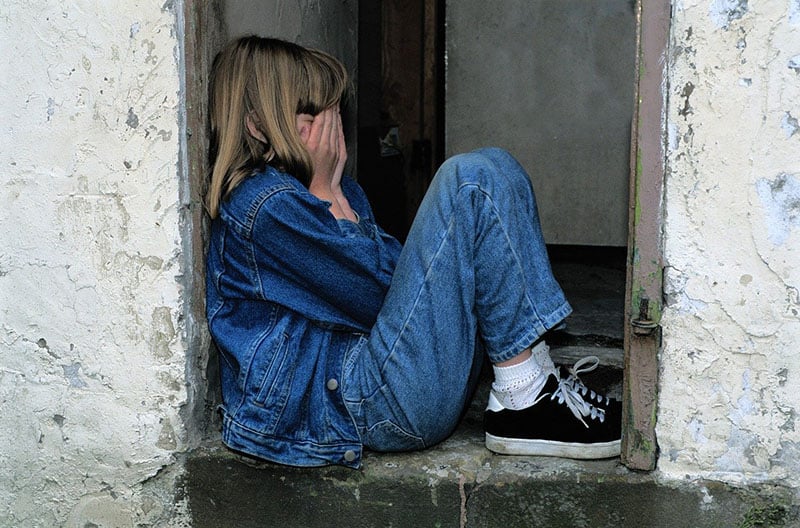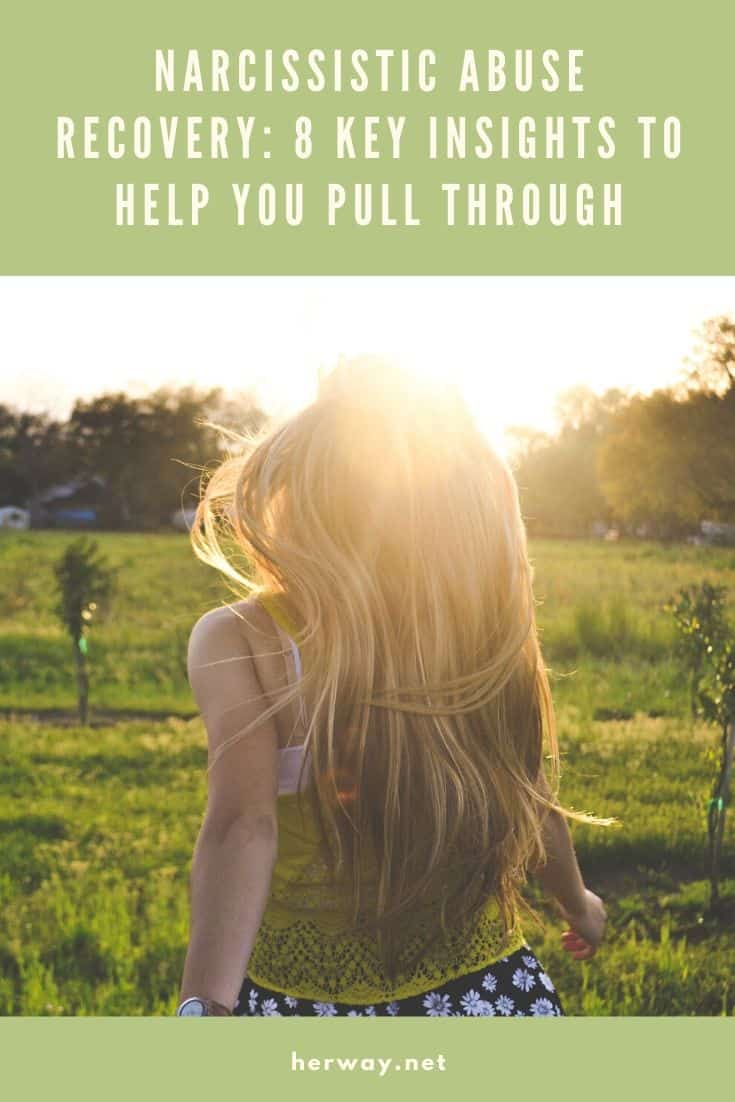Narcissistic Abuse Recovery: 8 Key Insights To Help You Pull Through
Narcissistic abuse recovery is one of the most complex things one can go through in life.
Narcissistic abuse is a severe form of emotional abuse, and unless it’s dealt with on time, it can wreak havoc on a person’s mind and shatter their self-esteem.
During narcissistic abuse recovery, your emotions can range from “I love this person and I can’t fathom a life without them” to “I can no longer remain in this abusive relationship, get me away from this sociopath!” in a matter of seconds.
This is precisely why it’s crucial to put your mental health first and run away at the first sight of a dysfunctional narcissistic relationship.

As a woman who has gone through hell and back with her narcissistic ex, I feel like I am well-equipped to share with you my step-by-step guide on the healing process and provide you with these core insights into the narcissistic personality disorder.
Unfortunately, narcissistic abuse (also followed by psychological abuse) is something I understand all too well, after having gone through a true roller coaster ride.
My recovery process has been shaky, but with the help of a solid support system, I’ve been able to create a new life away from my abusive relationship, and so can you!

I am proud to say that I’ve made full recovery, having found my voice again in an amazing support group, amongst other brave survivors of narcissistic abuse.
I’ve found that once you realize that your self-worth is far more important than a fragile man’s ego, letting go becomes easier.
I’m going to share with you some valuable insights that have helped me find my ground again after a long, treacherous case of narcissistic abuse.
I sincerely hope that this can help you find your true self again while you’re on your much-needed road to recovery.
See also: Why Can’t I Find Love? 10 Issues Stopping You From Finding The One
Narcissistic Abuse Recovery: What You Need To Know

I am extremely pleased to inform you that thriving after narcissistic abuse is possible.
Getting out of a toxic relationship may be a difficult and draining process, but it will ultimately help you regain your self-confidence and bring you one step closer to healing.
As an empath and abuse survivor, I’ve been through an array of complex emotions with my abuser, but I’ve managed to find my way back.
With the help of a narcissistic abuse recovery program and my cherished family members, here’s what I’ve come to discover.
Hopefully, these insights will provide you with the same peace of mind and a new lease on life.
1. Your past may have conditioned you to toxic relationships

Oftentimes, when people get involved with toxic individuals and enter an abusive relationship, it can be connected to their past.
Your narcissistic parents may have been the reason why you’ve convinced yourself that accepting emotional abuse is okay.
During your youngest years, you are prone to your parents’ and loved ones’ influence the most.
If you’ve been around a narcissistic mother and come from a deeply dysfunctional family, that may have triggered you to keep repeating the toxic cycle.
Your history of narcissistic partners and being around friends suffering from a narcissistic personality disorder has caused you to believe that this is what you deserve.

And do you know why? Because that’s all you’ve ever been shown.
Think back to your childhood and your formative years. Was narcissistic abuse a common occurrence?
Were you privy to toxic family members engaging in emotional abuse? Were you ever taught about the importance of self-love?
Developing healthy relationships is vital because it helps you see your self-worth and puts you on the right track from the get-go.
Think about all the red flags you may have ignored in your past and try to connect it all to your present. You might be surprised at what you’ll discover,
See also: 10 Crucial Differences Between Love And Infatuation
2. Denial may be stomping your recovery process

Denial is something we’re all familiar with. Sometimes, it’s just easier to lie to yourself than admit how things really are.
If you deeply want to be with someone, you’re going to ignore their red flags and lie to yourself that you’re just overreacting.
If you want to remain in your narcissistic mother’s life, you’ll program yourself to be in denial about her issues.
A false sense of reality is what people create when the idea of raw truth scares them.
But that eventually comes back to bite you in the ass, because you’re never introduced to the idea of a healthy relationship.

Denying the issues prolongs your suffering. Refusing to see people for who they get you into abusive relationships that take a piece of your soul day by dreadful day.
The impulse to lie and blame yourself for the sins of your loved ones is stomping your entire recovery process.
It’s self-destructive and counter-productive.
It creates unhealthy patterns that lead you to a toxic relationship with no way out. Breaking from the denial is a crucial step in your healing.
When you’re in a codependent relationship, denying your partner’s deficiencies helps you create a fake reality that you can live in. For as long as you live in constant denial, your recovery will never lead you to salvation.
3. A narcissist will never care about your feelings

As an empath, this has been one of the trickiest things to come to terms with. The fact of the matter is, a narcissist will never understand your point of view.
They will never be able to connect with you the way you want them to, and no matter how much you try, they will never truly care about your feelings.
To anyone with empathetic tendencies, a narcissist’s inability to feel will forever be incomprehensible. But you have to understand that their narcissistic personality disorder is a permanent impairment that cannot be ”solved” over time.
A narcissist is smooth, charming, deceitful, and extremely capable of getting their desired outcome in any situation. They are so scarily good at lying, that they’ll make you believe they actually have feelings.
But they don’t. Which is why narcissistic abuse comes so naturally to them.

They just don’t care. To them, their actions don’t come with consequences, as that would require having an emotional depth, which they don’t.
Save yourself the trouble of trying to get through to a toxic narcissist and decide to go no contact. That is the only way you will ever find peace.
You deserve some self-care and pampering, not gaslighting and narcissistic tantrums.
A pathological narcissist will never care about your point of view, explanations, or reasoning unless it fits with what they want. They seek personal gain and power, not love and devotion. Learn the difference and let them go.
See also: A Collection Of Getting To Know You Questions For A Deeper Insight
4. Avoiding the pain prolongs your suffering

Coming to grips with the reality of your narcissistic abuse and accepting that you’ve been a victim of a narcissistic relationship all this time is a daunting thing, to say the least.
Embracing the pain forces you to admit to yourself the truth you’ve been successfully avoiding all this time.
As a partner of a narcissistic boyfriend/girlfriend, you are mourning the loss of a relationship that has been the basis of your life for a significant amount of time.
As a child of narcissistic parents, you are mourning the loss of a parent who never really gave you the life you deserved.
All that leads to an array of emotions you’ve been sweeping under the rug for so many years, and now, you are faced with all of them at once. How do you cope with that?

There is no way around grief. Learning to live with the pain you’ve been avoiding for so long takes time.
Narcissistic abuse recovery is a long process and nobody expects you to simply get over something so traumatic in the blink of an eye.
The key to healing is embracing the pain and letting yourself go through the motions. A lot of the time, people try to find shortcuts to happiness but to be honest, there aren’t any.
Sit with your grief. Acknowledge its existence.
Let it wash over you and cry your tears until there’s nothing left to cry.
This entire spectrum of emotions is scary, but if you want to get to the other side, first you need to go through it and face your demons.
5. Acknowledging the effects of your trauma helps your healing

Narcissistic abuse is a deeply troubling trauma that one cannot simply get over and move on.
Especially if your emotional abuse has been a continual occurrence.
The emotional abuse you’ve been experiencing is a constant attack on your identity and the silent treatment you’ve been through teaches you that you don’t deserve their attention.
Don’t distance yourself from the traumatic effects this has left on you. Your emotional scars are real.
Your pain is real.
What you’ve been through is a major setback that has shifted your entire view on your self-worth.
If you’re struggling with symptoms of anxiety, depression, insomnia, or any type of illness, turn to a support group!
It will help you understand that what you’re going through is part of the process.

A support system is a must in times like these.
The worst thing you can do is isolate yourself and face your complex recovery alone. You deserve to regain your self-esteem!
You deserve to be able to go on social media and not fall apart after seeing your narcissistic ex flaunting their flashy lifestyle that you barely managed to escape.
Recognize the effects your narcissistic abuse has left on you and deal with them with care and caution. What happened to you is not okay.
But you can move past it and you will start feeling normal again.
Let yourself heal at a pace that allows you to process your issues without being overwhelmed.
See also: How To Get Over Someone: The Ultimate Guide To Moving On
6. You most definitely will get through this

During your narcissistic abuse recovery, you will often question your ability to pull through.
Your demons will catch up to you at some point and make you re-evaluate everything you’ve been trying so hard to escape.
But let me tell you a little secret. You are so much more powerful than you give yourself credit for.
Your capacity to heal is almost as insurmountable as your ability to love so selflessly.
You will see signs of healing once you get rid of the denial you’ve been living in and accept the actual reality as opposed to the one you’ve created.
When you come to terms with the fact that narcissism is virtually impossible to cure, letting go will be your only option.
When you start putting your mental health first and stop indulging toxic individuals, you will get another step closer to your final destination.

And that’s happiness, acceptance, growth, and self-confidence.
If right now, you don’t feel strong, powerful, and capable, that’s okay.
It all comes with time. But you will pull through.
Your narcissistic loved one won’t win.
Your recovery process may be a lengthy one, but it will also bring you the peace of mind a narcissist will never be able to have.
And in that, you can find some solace. When you’re finally at peace, you’ll see that every tear and every heartache was worth it.
7. By educating yourself, you’ll prevent it from happening again

One of the most common reasons why people allow themselves to get entangled with narcissists is their lack of knowledge of what constitutes one in the first place.
Take me for example. Prior to my abusive relationship, I was never fully aware of how deeply rooted narcissism truly is.
I always believed that a narcissist was a person who took far too many selfies and hung out on social media, flashing their body scarily too often.
But knowing what I know now, I wish I had educated myself better.
If only I knew how unstable and dangerous narcissistic abuse was, perhaps I could’ve saved myself a long time ago.
So now, I am encouraging you to empower your own strong self through education!
Learn what narcissism is and how damaging being close to one can be.
By learning as much as you can, you will help yourself recognize the signs later on.

You will never be able to fix a problem unless you learn to identify it first.
When you see that your pain was a byproduct of toxic love, it will make you see that it wasn’t your fault.
It will help you steer clear of narcissistic relationships and move you in the right direction toward healthy relationships.
Knowledge is power. Educate yourself and ensure a happy, fulfilling, toxic-free life that you know you deserve.
See also: 12 Reasons Why Your Second Love Is The Greatest One Of All
8. Let go of anyone standing in the way of your recovery

Here’s the tough truth. Not letting go of people who are in the way of your personal growth will just keep setting you two steps back for each step you take in the right direction!
It’s unhealthy and hazardous for your mental health. Put an end to it and weed out the ones who don’t belong by your side.
A person doesn’t have to put you through emotional and narcissistic abuse for you to realize they’re not good for you.
They can be toxic in an array of other ways, and it’s important that you recognize that.
Victim blaming is a common thing. Has anyone put you through it?
If so, let them go. Anyone who says that your struggle is your fault doesn’t deserve your closeness.
Anyone who keeps pressuring you to “get over it already” and keeps stating that “it wasn’t really that bad, you’re overreacting” is toxic, damaging, and needs to go.

Learn who means well and who is just tagging along for their own selfish purposes.
During your recovery, you will be vulnerable, emotional, and fragile. What you need is a strong support system that will never let you falter.
Anyone whose presence doesn’t bring you peace, joy, and calm needs to leave your side.
Right now, you’re at a crossroads, so think twice about who stays in your life and who you’re going to say your final goodbye to.
Not everyone deserves to stay in your life, and that’s okay.
Part of the recovery process is knowing who’s got your back and who was never really there for you in the first place.
See also: How Narcissists Treat Their Exes: 12 Shameless Ways
Nothing can stop you now!

After going through all of the steps of your narcissistic abuse recovery, you will reach the final stage. One that reintroduces you to the new you.
The person who doesn’t take shit from anybody. A strong, powerful, willful individual who’s been through hell and back and has landed on their feet.
Forgive yourself for all the times you weren’t strong enough to let them go. Forgive yourself for every tearful night you spent wallowing in misery, wondering when this emotional abuse would stop.
Forgive yourself for not knowing the lengths of your narcissist’s evil ways.
Back then, you didn’t know any better, but now, you’re a brand new person who just got a second chance at life.

And nothing can shatter your self-esteem now.
Nobody could make you doubt your own strength and resilience again.
After surviving your trauma and finding yourself again, you’re a force to be reckoned with.
Let them see you shine! They may try to hurt you.
They may try to make you fall. But now, you know better than to ever stoop to their level again.
You’re a brave new person who just got their groove back.
And you’ll be damned if you’ll ever let anyone take it from you again!
See also: What Is The Meaning Of Love? 12 Beautiful Sides To This Powerful Emotion







